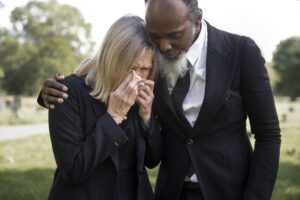Death of a Spouse: How to Manage Grief and Find Support
It’s the little moments that hurt as much as the major ones, like a quiet dinner without them or an early morning waking alone. When everything around you brings back the death of a spouse, you might ask how to deal with the death of a spouse. It’s normal to feel that way; this is a time of heartache, loneliness, and loss.
There is no one correct approach to handling loss; it comes in waves. You are not traveling this road alone, though, and there are ways to lessen suffering.
Understanding the Stages of Grief After Losing a Spouse
The trip of grief is quite personal. Though everyone experiences it differently, many go through phases that enable them to sort through the intense feelings. Understanding grief and its stages will help one to find clarity during this trying period. The death of a spouse sets off a range of emotions, including denial, resentment, bargaining, depression, and acceptance. These phases are not, however, rigid or linear. You might skip some totally, go back to another, or experience one. This is utterly natural.
Crucially, you must accept your emotions as they come. Denial, for example, might be how your mind manages the shock of the loss of a spouse. It guards you till you are ready to bear the whole weight of the suffering. As you work to understand the loss, anger can follow. You have to let yourself experience these feelings free from evaluation. Suppressing them could complicate the grieving process down the road.
Bargaining usually follows, in which case you could find yourself wondering what-if questions, trying to mentally alter the outcome. Depression then strikes – a deep sadness unchangeable. It’s important to give yourself the time to process your loss and realise that healing calls for this sadness.
Acceptance might arrive at last. This is not a stage for you to move on from your partner or forget. Rather, it means learning to live with your loss. Understanding grief and its stages will help you to see that there is no right or wrong way to grieve. Accepting your emotions will help you to start healing at your own speed.
Practical Steps and Checklist After Spouse Death
Dealing with the death of a spouse is difficult enough without the extra strain of handling pragmatic affairs. Here’s a death of a spouse checklist, including thorough instructions to help you negotiate the required actions following the loss of a partner.
- Notify family and close friends: One should get in touch with people closest to them. Not only will they want to be of support, but they can also assist you with quick chores like organizing or managing little responsibilities you shouldn’t have to deal with alone.
- Contact the funeral home: Setting up a funeral or memorial service will be among the first tasks. Everything from organizing the service to getting several copies of the death certificate – which will be crucial later on for legal and financial procedures – can be assisted by the funeral house.
- Obtain multiple copies of the death certificate: You will want certified copies of the death certificate to handle various legal and financial concerns, including insurance claims, closing accounts, and benefits management. To prevent delays, it’s best to obtain several copies.
- Handle immediate medical and legal matters: Should your partner be undergoing medical treatment or support medical services, you will have to inform providers and call off forthcoming visits. Additionally, it is crucial to tell health insurance providers and make sure any last medical records are handled.
- Inform insurance companies and banks: To claim anything, get in touch with your partner’s life insurance company. You will need the death certificate to notify banks to close or move accounts. Freeze any joint accounts as well to stop illegal activity.
- Update legal and financial records: This covers notifying Social Security for survivor benefits as well as the will and trusts. Your partner’s pension or retirement plans should also be changed if any exist. Update property deeds, close any joint accounts, and change utilities or services registered under their name.
- Seek grief counseling or join a support group: If not heavier, the emotional toll can be just as great as the pragmatic chores. Counseling or groups where you may meet others who know what you’re going through will help you find grief support. This stage will assist you in managing the pragmatic ones and negotiating the emotional ones.
This death of a spouse checklist is meant to help you negotiate the challenging actions that follow your loss. Remember, you don’t have to do everything at once; take things one day at a time, and don’t hesitate to ask friends, family, or professionals for help when you need it.
Finding Support: Grief Counseling and Support Groups
Following the death of a spouse, one often feels isolated, overburdened, and unsure about their direction forward. Although loss is inevitable, finding the appropriate support network can greatly assist in your coping. Whether through peer groups or professional counseling, seeking grief support can help you traverse the healing process and lessen the emotional weight.
Grief Counseling
Grief counseling provides a secure environment for freely examining your feelings. A counselor can equip you with the tools to negotiate the waves of emotion and help you realize that your grief will not follow a set course. By means of grief support, you will acquire techniques for controlling emotions of sadness, anger, and uncertainty, which can be rather taxing following the death of a spouse. Counseling lets you sort through these feelings while still clinging to the love and memories of your partner.
Support Groups
Grief support groups link you with people traveling a similar road. These organizations provide a forum for you to relate your stories, pay attention to others, and find solace in knowing you are not alone. Many times, others are experiencing the same difficulties you are going through; listening to their stories will help you find validation and peace. Participating in a grief support group might help you better grasp your emotions and the grieving process.
Family Caregiver Support
The change can seem even more confusing if you were a caregiver before your spouse passed. Counseling or family caregiver support groups can help you deal with the emotional toll of caring as well as the loss of your spouse. As they fit a new schedule and identity, many caregivers also deal with extra layers of loss. Your emotional well-being may depend critically on finding support during this change.
Moving Forward with Hope
Remember that the healing process is extremely personal, even as you manage grief following the death of a spouse partner. Grieving has no set schedule. You have to let yourself experience your feelings at your own speed. Counseling, groups, or family members who can walk beside you through this trying period will help you to surround yourself with grief support.
Even if it seems impossible right now, you will find purpose in life once more. Hoping forward does not mean discounting your spouse or moving on. It means respecting the love and memories you two created and gently letting fresh, happy events into your heart. It’s about including their memory in your life as you progressively discover a new direction.
The sharp anguish of loss may start to soften over time, enabling you to treasure the memories and welcome life once more. Healing is about learning to live with the past rather than about trying to forget it.





Post Comments